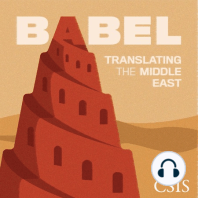24 min listen

Jordan's Economy During Covid-19
Jordan's Economy During Covid-19
ratings:
Length:
27 minutes
Released:
Jun 30, 2020
Format:
Podcast episode
Description
On this week's episode of Babel, Minister Mohamad al-Ississ joins Jon to talk about Jordan's economy before, during, and after Covid-19. Minister al-Ississ is the Kingdom of Jordan's minister of finance and was previously the minister of planning and international cooperation. During our discussion, the minister breaks down Jordan's recent economic history, the economic recovery plan, and efforts to formalize the informal sector. Then, Jon, Will, and McKinley discuss the impact refugees have had on Jordan.
Harun Onder, The Fallout of War: The Regional Consequences of the Conflict in Syria, The World Bank, 2020.
Jon Alterman, “The Middle East’s Challenges Aren’t Just Combatting the Virus,” CSIS, April 28, 2020.
Bruce Riedel, “Jordan’s unique coronavirus challenge,” Brookings, April 16, 2020.
Manjari Singh, “Jordan after COVID-19: From Crisis Adjustment to Crisis Management,” The Washington Institute, April 15, 2020
Episode Transcript, “Jordan’s Economy During Covid-19,” June 30, 2020
Harun Onder, The Fallout of War: The Regional Consequences of the Conflict in Syria, The World Bank, 2020.
Jon Alterman, “The Middle East’s Challenges Aren’t Just Combatting the Virus,” CSIS, April 28, 2020.
Bruce Riedel, “Jordan’s unique coronavirus challenge,” Brookings, April 16, 2020.
Manjari Singh, “Jordan after COVID-19: From Crisis Adjustment to Crisis Management,” The Washington Institute, April 15, 2020
Episode Transcript, “Jordan’s Economy During Covid-19,” June 30, 2020
Released:
Jun 30, 2020
Format:
Podcast episode
Titles in the series (100)
Russian Disinformation in Syria: Russia is spreading disinformation in the Middle East, especially in Syria, in order to discredit its critics and advance its interests. by Babel: Translating the Middle East